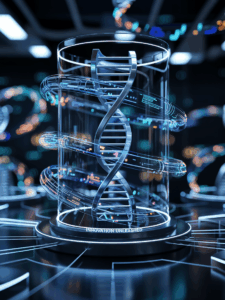Mood & Emotions Unravelled !

Introduction: Understanding the Link Between Genes and Emotions
Have you ever wondered why some people seem naturally more optimistic, while others are more prone to feeling down or anxious? Or why some individuals can face life’s challenges with resilience, while others struggle with overwhelming sadness or stress? The answer may lie, at least in part, in our genes.
For decades, scientists have been exploring the relationship between our genetics and our emotions. While life experiences and environment certainly play significant roles in shaping our moods, an increasing body of research suggests that our genes can influence how we feel, how we respond to stress, and how susceptible we are to mood disorders such as depression, anxiety, and bipolar disorder.
In this article, we’ll dive into the fascinating world of mood-related genes—those genetic variations that affect our emotional health and help explain why we might feel the way we do. We’ll also discuss how these discoveries can provide insights into improving mental health treatments and interventions.
What Are Mood-Related Genes?
Mood-related genes are specific genes that influence the biological pathways involved in mood regulation. These genes control how our brain processes chemicals, how we respond to stress, and how our emotions are balanced. Neurotransmitters like serotonin, dopamine, and norepinephrine are key players in these processes, and many mood-related genes are directly involved in their production, release, or breakdown.
In simpler terms, mood-related genes help determine how our brain “feels” and responds to the world around us. Just like how some people have a genetic predisposition for traits like height or eye color, we also have a genetic makeup that can predispose us to certain emotional responses or vulnerabilities.
The Science of Mood Regulation
Before we explore specific genes, let’s take a quick look at how mood regulation works in our brain. The brain communicates through chemicals called neurotransmitters, which help transmit signals between nerve cells. These neurotransmitters are critical for regulating emotions, cognition, and behavior.
Serotonin: Often referred to as the “feel-good” neurotransmitter, serotonin helps regulate mood, appetite, and sleep. Low levels of serotonin are commonly linked to depression and anxiety.
Dopamine: This neurotransmitter is involved in the brain’s reward and pleasure system. It’s often associated with feelings of motivation, joy, and satisfaction. Imbalances in dopamine can be linked to conditions like depression, schizophrenia, and ADHD.
Norepinephrine: Known for its role in the body’s “fight or flight” response, norepinephrine is essential for stress regulation. It also plays a role in arousal and alertness. Dysregulation of norepinephrine has been linked to anxiety and depression.
These neurotransmitters are influenced by various mood-related genes, which control their production, release, and activity in the brain.
Key Mood-Related Genes and Their Role in Emotional Health
- Serotonin Transporter (SLC6A4)
One of the most well-known mood-related genes is SLC6A4, which encodes the serotonin transporter protein. This protein is responsible for recycling serotonin in the brain. Variations in this gene can affect how efficiently serotonin is taken back into nerve cells after it has been released, ultimately influencing mood regulation.
The 5-HTTLPR Polymorphism: A specific variation in the SLC6A4 gene, known as the 5-HTTLPR polymorphism, has been widely studied. People with a short allele of this polymorphism tend to have a less efficient serotonin system, making them more susceptible to mood disorders, especially under stressful conditions. Research suggests that people with this variation may be more prone to developing depression after experiencing significant stress or trauma.
- Brain-Derived Neurotrophic Factor (BDNF)
BDNF is often described as “fertilizer for the brain” because it promotes the growth and survival of neurons. It also plays a critical role in synaptic plasticity, which is the brain’s ability to form and reorganize synaptic connections.
BDNF and Depression: Research has shown that lower levels of BDNF are associated with depression and other mood disorders. Additionally, a specific variation of the BDNF gene, known as Val66Met, has been linked to an increased risk of depression. People with the Met variant tend to have lower BDNF activity, which can affect brain function and emotional resilience.
- Catechol-O-Methyltransferase (COMT)
The COMT gene encodes an enzyme that breaks down dopamine, a neurotransmitter involved in mood regulation. Variations in the COMT gene, particularly the Val158Met polymorphism, can affect dopamine levels in the prefrontal cortex, the brain region responsible for decision-making, emotional regulation, and impulse control.
COMT and Emotional Health: People with the Val variant of the COMT gene tend to have higher enzyme activity, which leads to lower dopamine levels. This has been associated with a higher risk of mood disorders like anxiety and depression, especially in stressful environments.
- Dopamine Receptor D4 (DRD4)
The DRD4 gene encodes a receptor for dopamine, a key neurotransmitter that influences mood, motivation, and reward processing. Variants of this gene have been linked to different emotional traits and behaviors.
DRD4 and Mood Disorders: The DRD4-7R variant of the gene, which is characterized by a longer receptor, has been associated with novelty-seeking behaviors, impulsivity, and emotional instability. This variant may increase vulnerability to mood disorders like depression and anxiety.
- Monoamine Oxidase A (MAOA)
MAOA is an enzyme that breaks down neurotransmitters like serotonin, dopamine, and norepinephrine. The activity level of this enzyme can influence emotional responses.
MAOA and Aggression: A variation in the MAOA gene, often referred to as the “warrior gene,” has been linked to aggressive and impulsive behavior. While not directly associated with mood disorders, certain MAOA variants have been shown to increase the risk of depression and anxiety, especially when combined with childhood trauma.
- Glucocorticoid Receptor (NR3C1)
The NR3C1 gene encodes the glucocorticoid receptor, which is responsible for the body’s response to cortisol, a hormone released during stress. This gene is crucial in regulating how we react to stressful situations.
NR3C1 and Stress Sensitivity: Variations in NR3C1 can affect an individual’s stress response, making them more or less sensitive to cortisol. People with certain variants of this gene may have an increased susceptibility to mood disorders like depression, especially after experiencing chronic stress.
How Do These Genes Interact With Environment?
While genetics plays an essential role in shaping our emotional responses, the environment also significantly influences how mood-related genes express themselves. This interaction is known as gene-environment interaction.
For example, a person with a genetic predisposition for depression (due to variations in genes like SLC6A4 or BDNF) may only develop depression if they experience significant stress, trauma, or other environmental triggers. Conversely, someone with a resilient genetic makeup may be able to cope with stress more effectively, even in the face of adversity.
The Future of Mood Disorder Treatment
Understanding mood-related genes opens the door to more personalized and effective treatments for mood disorders. For instance, knowing a person’s genetic makeup could help doctors tailor antidepressant therapies to their specific needs. Additionally, understanding gene-environment interactions could lead to preventive strategies that help people with certain genetic predispositions to better manage stress or build emotional resilience.
Research into mood-related genes is also paving the way for new therapeutic approaches, including gene therapy and other advanced treatments that target the underlying genetic causes of mood disorders.
Conclusion: The Genetic Puzzle of Our Emotions
Mood-related genes are just one piece of the complex puzzle that makes up our emotional health. These genes influence how we feel, how we respond to stress, and how susceptible we are to mood disorders. But they don’t tell the whole story—our environment, experiences, and lifestyle choices all contribute to our emotional well-being.
As science continues to uncover the genetic foundations of mood regulation, we may soon see more personalized, effective treatments for mood disorders. But for now, understanding the role of mood-related genes is a step toward breaking the stigma surrounding mental health and helping individuals take control of their emotional health.
References:
Caspi, A., et al. (2003). “Influence of life stress on depression: moderation by a polymorphism in the 5-HTT gene.” Science, 301(5631), 386-389.
Gratacòs, M., et al. (2007). “BDNF Val66Met polymorphism and psychiatric disorders: meta-analysis of case-control studies.” Journal of Affective Disorders, 101(1–3), 207-213.
Meyer-Lindenberg, A., et al. (2006). “Neurocognitive endophenotypes of psychiatric disorders.” Nature Neuroscience, 9(5), 546-548.
Meyer-Lindenberg, A., et al. (2005). “Genetic mechanisms of social cognition in schizophrenia.” Neuron, 47(5), 463-478.
Heim, C., et al. (2000). “The impact of childhood trauma on the neurobiology of depression.” CNS Spectrums, 5(12), 35-44.
Brunoni, A. R., et al. (2013). “The impact of COMT polymorphisms on mood disorders and the effects of psychiatric treatments.” European Neuropsychopharmacology, 23(5), 437-446.
Tannenbaum, D. M., et al. (2012). “The MAOA gene and behavior: Implications for emotional health.” Biological Psychiatry, 71(1), 5-10.
Zunszain, P. A., et al. (2011). “Corticosteroid receptor function in the brain and its role in mental health.” Psychological Medicine, 41(4), 721-735.
Flint, J., & Kendler, K. S. (2014). “The genetics of major depression.” Neuron, 81(3), 484-503.
Kato, T. (2017). “The genetics of mood disorders: The role of serotonin and dopamine systems.” Psychiatry and Clinical Neurosciences, 71(11), 770-780.
Sullivan, P. F., et al. (2012). “Genetic architectures of psychiatric disorders: The emerging view from GWAS.” Nature Reviews Genetics, 13(8), 537-551.
Holmes, E. A., et al. (2018). “Psychological treatments and gene-environment interactions in the treatment of depression.” The Lancet Psychiatry, 5(6), 441-452.
Nestler, E. J., et al. (2002). “Neurobiology of depression.” Neuron, 34(1), 13-25.
Mackenzie, G., & Bogue, J. (2006). “Gene-environment interactions in the pathophysiology of major depression.” Archives of General Psychiatry, 63(3), 321-324.
Bierut, L. J., et al. (2007). “A genetic variant of the dopamine receptor (DRD4) gene is associated with attention-deficit hyperactivity disorder.” Journal of the American Medical Association, 298(4), 402-408.
Liu, Y., & Wang, X. (2015). “Role of neurotrophic factors in emotional health and psychiatric disorders.” Frontiers in Neuroscience, 9, 279.
Tye, K. M., et al. (2013). “Optogenetic investigation of neural circuits underlying emotional behaviors.” Journal of Neuroscience, 33(19), 8753-8760.
Kremen, W. S., & Faraone, S. V. (2007). “Genetic influences on the neurobiology of psychiatric disorders.” Neuropsychopharmacology, 32(9), 2326-2335.
Disclaimer: This information is for educational purposes only and is not a substitute for professional medical advice or diagnosis.
Premium Ingredients and Best-Optimized Blends

• Increase Metabolism
• Burn Fat Faster
• Reduces Appetite
• Decrease Blood Sugar
• Increase Adiponectin Levels

• Contain Phytoestrogens
• Increase Blood Flow
• Improve Sexual Function
• Reduce Fatigue and Arthritic Pain

• Contain Hydroxycitric Acid
• Control Appetite
• Reduce Abdominal Fat Accumulation
• Booster Metabolism

• Contain Chlorogenic Acid and Caffeine
• Boost Fat Metabolism
• Control Appetite
• Lower Cholesterol and Triglycerides Levels
© 2025 Lyvv Science, Inc. All Rights Reserved.
Cart
No products in the cart.
